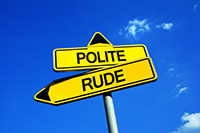
By Heather Nezich, courtesy of SBAM Approved Partner ASE
A new study revealed that witnessing a rude act in the morning can hurt work performance all day. Additional studies have shown that the disengagement caused by rudeness can result in significant revenue loss and project delays.
In the study published in the Journal of Applied Psychology, they found that simply witnessing a rude act in the morning can ruin a person’s entire day. The study looked at 81 managers of an executive MBA program at the University of Florida. They exposed them to a video at 7:00 a.m. that showed either neutral or rude behavior. They also gave each participant four sentences to unscramble. Each sentence focused on disrespectful or neutral behaviors.
At 4:00 p.m. each participant completed a survey about their day. Nearly everyone who witnessed rude behavior in the morning video reported the perception of incivility in the workplace that day. The rudeness had tainted their perceptions for the entire day. “With your brain, everything is arranged in a semantic network,” Dr. Woolum, the lead researcher, says. “So if I say ‘bird,’ you are likely to recall tree, sky, feathers, etc. These are related nodes, closely linked to the concept of birds,” he explains. “So when incivility or rudeness is witnessed in the morning, it calls to mind related concepts. That also means that when you encounter ambiguous behavior in the workplace later in the day, you are primed to see it as indicative of rudeness.”
It’s amazing how one person’s action could affect several people’s entire day. It reduces productivity, decreases morale, increases turnover, and damages customer relationships. Dealing with its aftermath involves significant managerial attention and time. But there are steps leaders can take to counteract rudeness in the office:
- Monitor your own behavior. Request feedback on it, and make sure that their actions are a model for others.
- Hire with civility in mind. Behavioral assessments can help to identify behavior patterns.
- Don’t ignore it. Ignoring is telling employees that it’s acceptable. If you witness it, deal with it.
- Deal directly with the culprit. Speak to them in private and tell them how their behavior is affecting others.
- Listen to the offender. Find out what triggered it and look for ways to help him/her deal with a similar situation next time.
- Create group norms and expectations, reward good behavior, and penalize bad behavior.
- Let teams know what type of behavior is considered rude, such as:
Failing to acknowledge another person’s presence
Using abusive language
Gossiping
Discounting employee contribution
Bullying or intimidation
Poor communication etiquette
Rudeness has direct impact on productivity and employee retention. 1 in 8 employees who’ve experienced rudeness at work will leave their jobs for a less stressful environment. A little rudeness can stretch far into the organization and have extreme affects on employee performance. As a leader, be sure to address it head-on in order to avoid even bigger issues down the road.